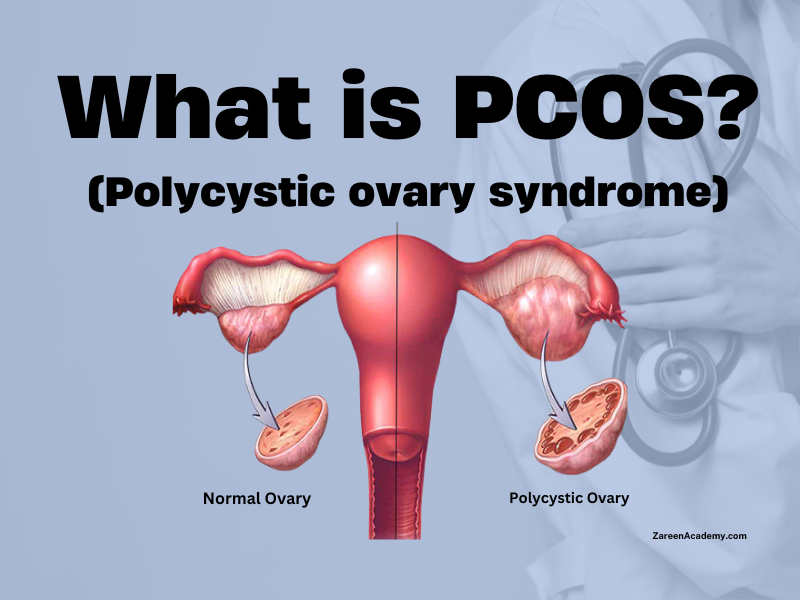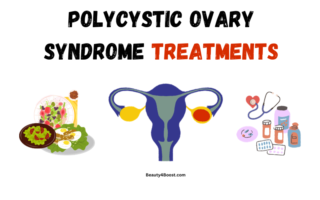PCOS: A Comprehensive Guide to Polycystic Ovary Syndrome, Its Causes, and Treatment
Introduction
Polycystic Ovary Syndrome (PCOS) is a common hormonal disorder that affects many women worldwide. Understanding PCOS, its causes, and treatment options is crucial for those living with this condition. In this comprehensive guide, we will explore PCOS in detail, offering insights and information to help you manage this syndrome effectively.
PCOS – What Is It?
PCOS is a hormonal disorder that affects people with ovaries. It is characterized by irregular menstrual cycles, excess androgen levels, and the development of small fluid-filled sacs (cysts) in the ovaries. PCOS can impact various aspects of a person’s health, including fertility, insulin resistance, and overall well-being.
PCOS Causes
Understanding the causes of PCOS is essential for effective management. While the exact cause of PCOS remains unknown, several factors contribute to its development:
Genetic Predisposition
Genetics plays a significant role in the development of PCOS. If you have a family history of PCOS, you may be at a higher risk of developing the condition.
Insulin Resistance
Insulin resistance is a common factor in PCOS. It can lead to increased insulin levels in the body, affecting hormone production and leading to various symptoms of PCOS.
Hormonal Imbalance
Hormonal imbalances, especially increased androgen levels, are a hallmark of PCOS. These imbalances can lead to irregular menstrual cycles, acne, and excess facial and body hair.
Inflammation
Chronic inflammation may contribute to PCOS symptoms. Inflammation can affect insulin sensitivity and hormone production.
PCOS Treatment Options
Living with PCOS can be challenging, but various treatment options can help manage its symptoms and improve your quality of life. Some common treatments include:
Lifestyle Changes
Making healthy lifestyle changes, such as maintaining a balanced diet, exercising regularly, and managing stress, can help regulate your menstrual cycle and reduce PCOS symptoms.
Medications
Medications, like birth control pills, can help regulate your periods and control androgen levels. Metformin is another option that can improve insulin sensitivity.
Fertility Treatments
For those trying to conceive, fertility treatments like ovulation-inducing medications or in-vitro fertilization (IVF) may be necessary.
PCOS is a common endocrine disorder that affects many women of reproductive age, and it can often lead to fertility issues. Fertility treatments play a significant role in helping women with PCOS overcome these challenges and achieve their goal of becoming pregnant. These treatments are tailored to address the specific factors that hinder conception in individuals with PCOS.
One of the primary fertility treatments for PCOS is ovulation induction, typically achieved with medications like clomiphene citrate or letrozole. These drugs help regulate the menstrual cycle and stimulate the ovaries to produce mature eggs. In cases where medication alone is insufficient, assisted reproductive technologies such as in vitro fertilization (IVF) or intrauterine insemination (IUI) may be recommended.
IVF involves the fertilization of eggs with sperm in a laboratory setting, while IUI involves the introduction of processed sperm directly into the uterus. These procedures can be particularly effective in addressing fertility issues related to PCOS. Additionally, lifestyle modifications, including weight management and dietary changes, are often recommended to improve the overall health of individuals with PCOS and enhance their chances of successful conception. Fertility treatments in PCOS are highly individualized, taking into account the specific needs and goals of each patient to provide the best possible chance of achieving a healthy pregnancy.
Surgery
In some cases, surgery may be recommended to remove ovarian cysts or to address other complications.
PCOS FAQs
Is PCOS curable?
No, PCOS is not curable, but its symptoms can be managed effectively with the right treatments and lifestyle changes.
Can PCOS lead to infertility?
PCOS can affect fertility, but with the appropriate medical intervention, many women with PCOS can conceive.
Are there natural remedies for PCOS?
While there are no natural cures for PCOS, lifestyle changes such as a healthy diet and regular exercise can help manage its symptoms.
How can I reduce the hair growth caused by PCOS?
Hair growth can be reduced through treatments like laser hair removal, medications, or by managing hormone levels with medication.
Does PCOS increase the risk of other health issues?
PCOS is associated with an increased risk of type 2 diabetes, high blood pressure, and cardiovascular problems. Regular medical check-ups are crucial for early detection and management.
Can men develop PCOS?
No, PCOS is a condition that affects individuals with ovaries. Men cannot develop PCOS.
Conclusion
PCOS can be a challenging condition to manage, but with the right knowledge and support, it is possible to lead a healthy and fulfilling life. By understanding the causes and available treatment options, you can take control of your PCOS journey. Remember that you are not alone, and there are numerous resources and healthcare professionals available to help you on this path.





I am sure this paragraph has touched all the internet viewers, its really really
fastidious piece of writing on building up new webpage.